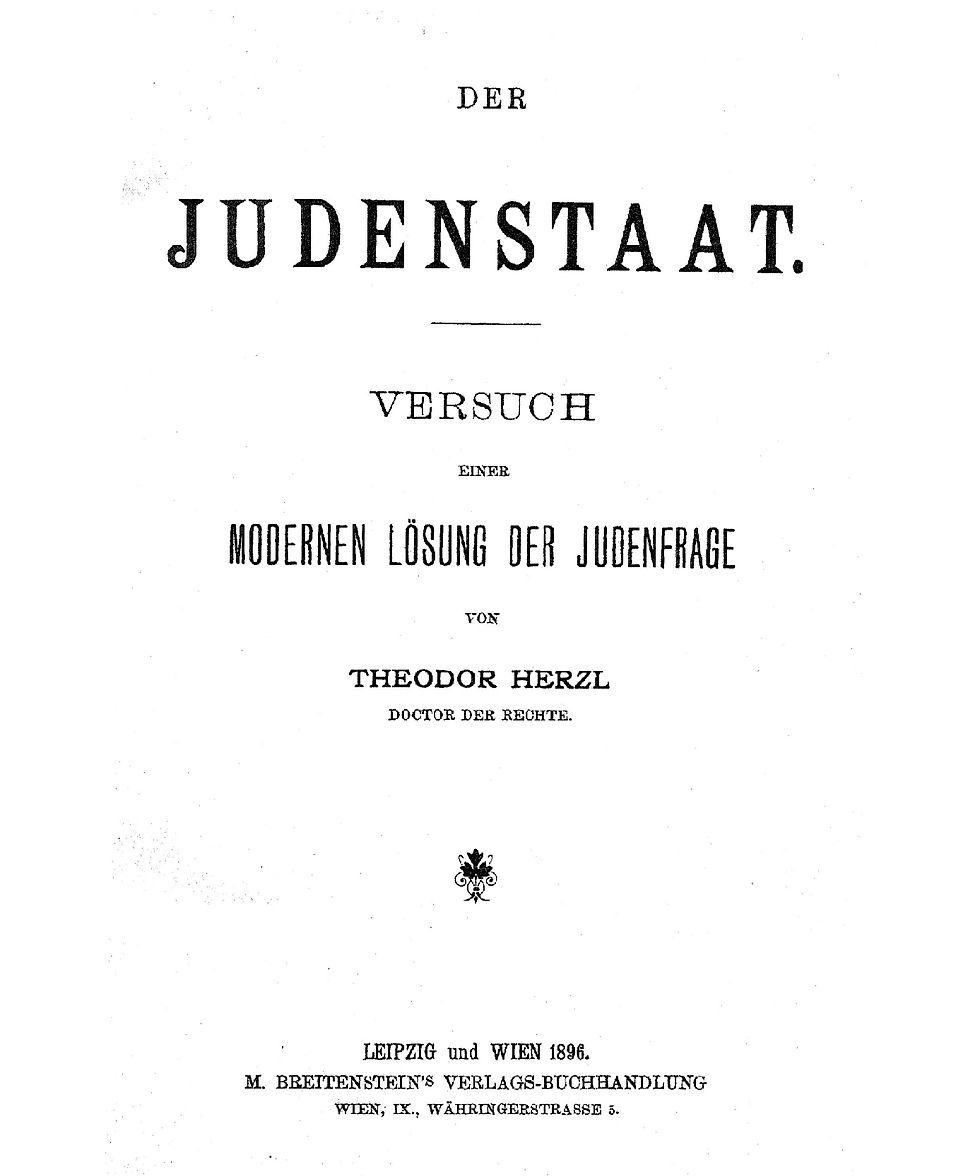Theodor Herzl
- My Old New Land

- Feb 3, 2023
- 4 min read
Updated: May 11, 2025
1860 - 1904.
Benjamin Zeev Theodor Herzl was the founder of Political Zionism and founder of the Zionist Organization.
He was born to a secular Jewish family in Budapest and was the eldest of three children.
He studied law at the University of Vienna. He was a journalist by profession and worked as a correspondent for several newspapers in Europe.
Herzl's early career was marked by his indifference to Zionism and lack of focus on Jewish life.
As a young man, he firmly believed that cultural appropriation of German culture and society was the key to Jewish emancipation.
In 1889, he married Julie and had three children.
In 1894, while working in Paris as a correspondent for the Neue Freie Presse (a Viennese newspaper), Theodor witnessed the Dreyfus Affaire*. He witnessed the hate people had for Jewish people, screaming “Death to the Jews” on the streets of France. This affair profoundly impacted his beliefs and Political Zionism's genesis.
In 1896, Herzl published "The Jewish State" ("Der Judenstaat") a book that outlined his vision for the establishment of a Jewish homeland. He argued that the Jewish people should leave Europe for Palestine, their historic homeland. The book encountered both praise and criticism but galvanized the Jewish community and sparked a renewed interest in the idea of a Jewish homeland. Supporters of existing Zionist movements such as Hovevei Zion immediately allied themselves with him. He saw the Jewish question as an international political question to be dealt with in the arena of international politics.

"The Jews have dreamt this kingly dream all through the long nights of their history. "Next year in Jerusalem" is our old phrase. It is now a question of showing that the dream can be converted into a living reality." The Jewish State, Introduction.
Despite the lack of support of some wealthy Jews and the vain negotiations with the Ottoman Empire (which controlled Palestine at that time), Herzl organized the First Zionist Congress in Basel (Switzerland) in 1897.
This brought together Jewish leaders from around the world to discuss the future of the Jewish people. At the congress, Herzl outlined his plan for establishing a Jewish State and proposed the creation of a Jewish National Fund to purchase land in Palestine for Jewish settlement. The congress was a success, and it marked the birth of the Zionist movement, which sought to establish a Jewish state in the land of Israel.
During this first congress, the World Zionist Organization was created.
Between 1897 and 1904, he led the 6 first Zionist Congresses. During this period, Zionist tools were built to defend the Jewish cause, such as the Jewish National Fund (today called KKL- Keren Kayemet LeIsrael), and the movement’s newspaper Die Welt ("The World").
In the years 1896-98 Herzl tried to obtain the support of wealthy Jews for the establishment of a Jewish state. He also tried to receive a concession from the Ottoman Empire and the Grand Vizier for Jewish settlement in the Land of Israel. Herzl proposed that the Jews would pay the Turkish foreign debt and help Turkey regain its financial footing in return for Palestine as a Jewish homeland. In 1901, the proposition was rejected by Sultan Abdul Hamid II.
In 1898, during his first trip to Palestine, Herzl met the German Kaiser in Mikve Israel, and Jerusalem. The meetings significantly advanced Herzl's and Zionism's legitimacy in Jewish and world opinion. The Kaiser however didn't show further interest in the Zionist project and in Herzl and made no promises.
Herzl witnessed the Kishinev pogrom and Russian Jews' plight during a trip to Russia in 1903, which impacted him deeply. He asked the Russian government to help the Zionist Movement relocate Jews from Russia to Palestine.
Herzl then turned to Great Britain in 1903 but only received a proposal for a Jewish autonomous region in Uganda.
At the 6th Zionist Congress (1903), Herzl proposed the Uganda Scheme as a temporary refuge for Jewish refugees from Eastern Europe. The proposition caused controversy and was rejected at the 7th Congress. However, Herzl managed to prevent a split in the movement, and at the closing sitting of the Congress declared in Hebrew: "Im eshkacheh Yerushalayim, tishckah yemini"- If I forget you, Jerusalem, let my right hand forget its skill.
Despite the many obstacles Herzl encountered he continued to work tirelessly to promote the Zionist cause. His role was necessary for securing the support of influential figures and governments.
In 1904, Herzl died at 44 from a heart attack and did not live to see the Uganda plan rejection.
He coined the following motto leading to the establishment of the State of Israel 50 years later.
"If you will, it is no fairytale" - "אם תרצו אין זו הגדה"
Despite his untimely death, his ideas and efforts played a key role in the establishment of the State of Israel in 1948. Herzl is remembered as the father of modern political Zionism and one of the most influential figures in Jewish history. His works "The Jewish State" and "Altneuland" ("The Old New Land") have been widely published and translated.
Each of his three children had a tragic end: Paulina died of a drug overdose, Hans shot himself, and Trude perished in a concentration camp. Herzl's grandson Stephen committed suicide in 1946 and was buried on Mount Herzl in 2007.
You can listen to the song on Herzl's journey to build the Jewish State on the following link, written by Yair Rozenblum for the IDF. Many other influential Zionists are mentioned in the songs.
*In 1894, the Jewish artillery officer Alfred Dreyfus was falsely convicted of spying for Germany. He was sentenced to life imprisonment, and due to the mobilization of the intellectual circle of France, he instead spent 9 years in prison.
Sources:



Comments